By Etan Walker
It’s true that the blank page can be scary. Every writer faces writer’s block at some point, whether they are a professional lyricist with a schedule or an independent musician who just can’t get that catchy hook out of their head and onto paper. Songwriters have been struggling for years to come up with new rhymes, great metaphors, and stories that make sense. What if you had a tireless co-writer, a genius at coming up with ideas, and a dictionary of rhymes all in one?
Here we are in the year 2025. The top AI platforms for lyrics and writing are changing the way music is made and stories are told. I talked to Sarah, an Austin-based indie pop singer, just last month. She told me that a single song used to make her cry for days on end. “I hit a wall trying to find a fresh way to describe heartbreak,” she said. That’s the power we’re talking about: not replacing human creativity, but amplifying it. I put in some keywords, like “rain,” “empty coffee cup,” and “missed calls,” and within minutes, it came up with a dozen new ideas. One line, “The silence screams louder than any goodbye,” led to a whole new verse. It didn’t write the song for me, but it broke the dam.
There is more competition than ever in the music business, and writers are always looking for ways to get ahead. In these situations, AI comes in handy, working with us creatively instead of taking our place. Here’s why the best AI platforms for writing words and songs are becoming necessary for all modern artists:
All right, let’s get to the big ones. These are the sites that are making waves in the world of writing songs and other creative works. We’ll look at what each one does, who it’s for, and how to get the most out of it
Brief Introduction:
People all over the world know OpenAI’s suite, especially ChatGPT and the newest GPT-4 model, for its wide range of natural language abilities. It’s not a song generator in and of itself, but the fact that it can understand context, come up with creative text, and repeat prompts makes it a great tool for lyricists. It’s like having a super-smart helper that can do anything, from coming up with themes to making up complicated metaphors.
Key Features:
Best For:
Brief Introduction:
Google Gemini is a multimodal AI, which means it can understand and handle different kinds of information, such as text, code, images, and maybe even audio and video. This opens up an interesting way for lyricists and songwriters to combine text prompts with ideas about melody or mood, making it possible for more streamlined creative processes.
Key Features
Who Can Use It:
Brief Introduction:
Claude from Anthropic was made with safety and helpfulness in mind, with the goal of being a more moral AI helper. For creative writers, this means a reliable tool that is less likely to come up with rude or inappropriate content and more likely to come up with creative and helpful answers. That makes it a great choice for people who want to use AI in their artistic process in a responsible way.
Key features:
Who Can Use It:
If you’re trying to make art, it might be less focused on rapid-fire, varied rhymes and more on being cautious when creating edgy or controversial material.
Brief Introduction:
Jasper.ai is a well-known AI for making content, but its real strength is its large library of themes. Many of them can be used for different things or even to write songs directly. It’s great at making short, punchy, and interesting copy, which makes it a great tool for writing catchy hooks, memorable lyrics, or even short jingles. It’s one of the best AI tools for writing lyrics and songs if you like to follow a plan.
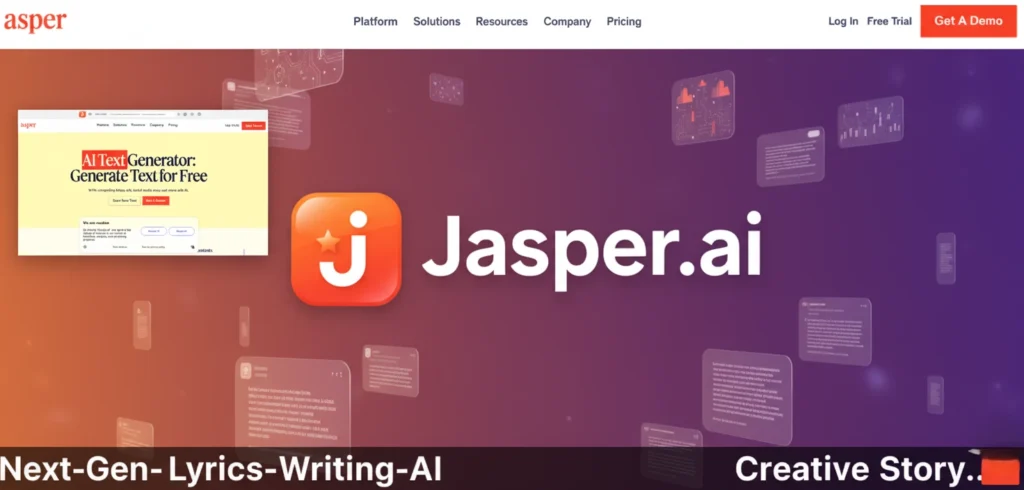
Key Features:
Who Can Use It:
Brief Introduction:
Writesonic is another powerful AI writing helper that is especially good at quickly and easily creating short pieces of writing. This is great for lyricists because it helps them get past that initial “blank-page” block by giving them interesting verse starters, memorable chorus lines, and strong theme hooks to build on.
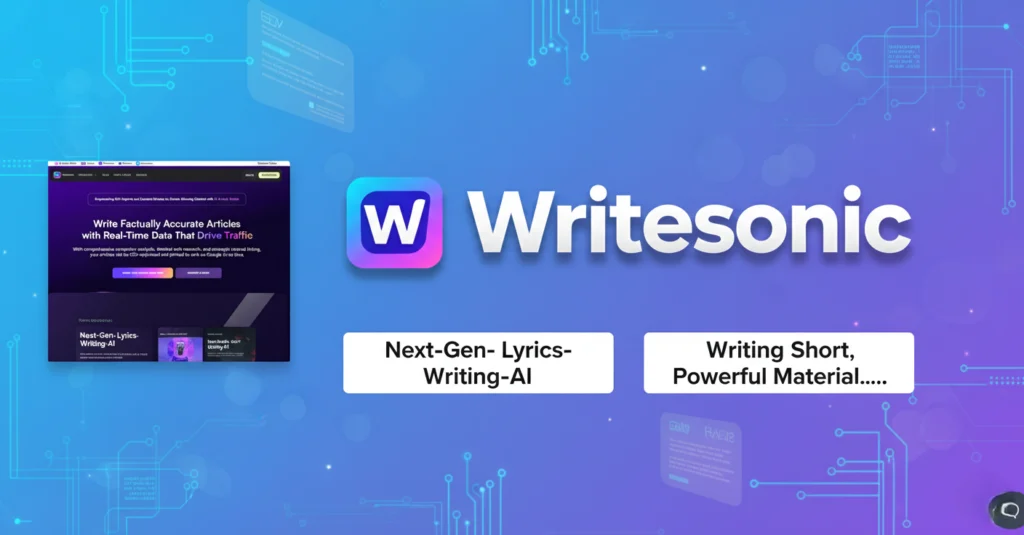
Key features:
Who Can Use It:
Brief Introduction:
Copy.ai is a powerful platform for making content. It’s known for being flexible when it comes to writing marketing copy, but its creative tools are a real gem for musicians. It’s good at coming up with new ideas, making vivid pictures, and helping you write interesting stories in your songs because it has different templates and a conversational chat mode.
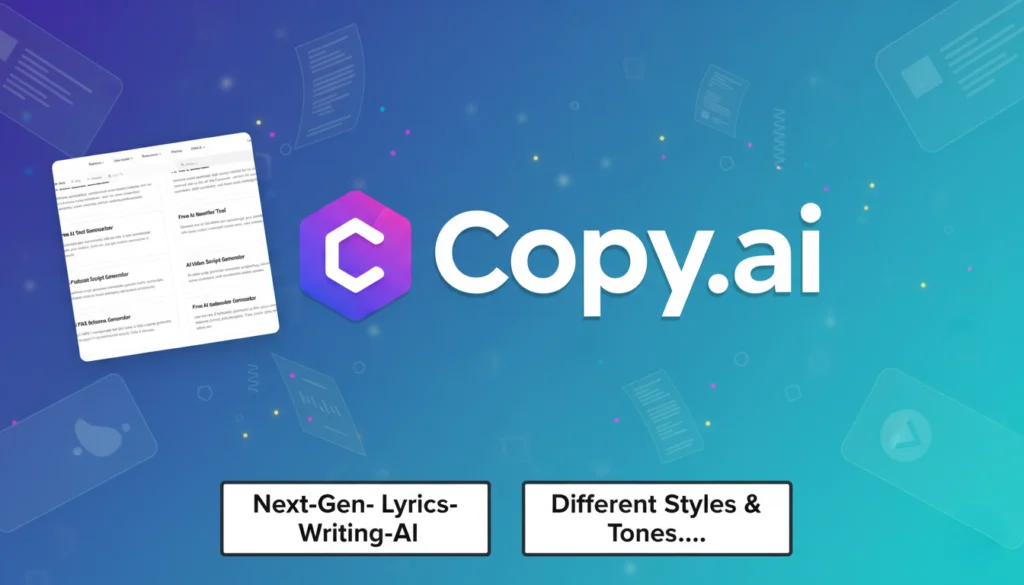
Key Features:
Who Can Use It:
Brief Introduction:
Sudowrite is an AI writing helper that was made to help fiction writers, but lyricists can also really benefit from its special features. It’s great at “showing, not telling,” which means it can create vivid descriptions, build on ideas with rich images, and suggest strong metaphors. These are all important parts of writing compelling songs. Sudowrite is your friend if you have trouble making your words sound more poetic.
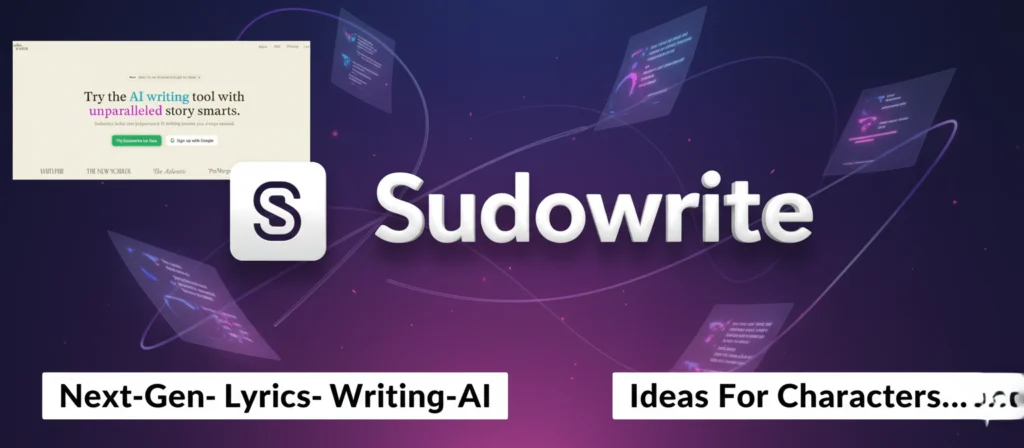
Key Features:
Who Can Use It:
Brief Description:
LyricStudio is an AI engine made just for making songs and working together.
Not many platforms were made with songwriters in mind, but LyricStudio is one of the few that really is. It’s not a general-purpose AI writer; it’s an AI text generator that helps you write whole songs. As one of the best AI for lyric writing tools, it knows how hard it is to write songs and offers custom solutions, like rhyme ideas and thematic prompts.
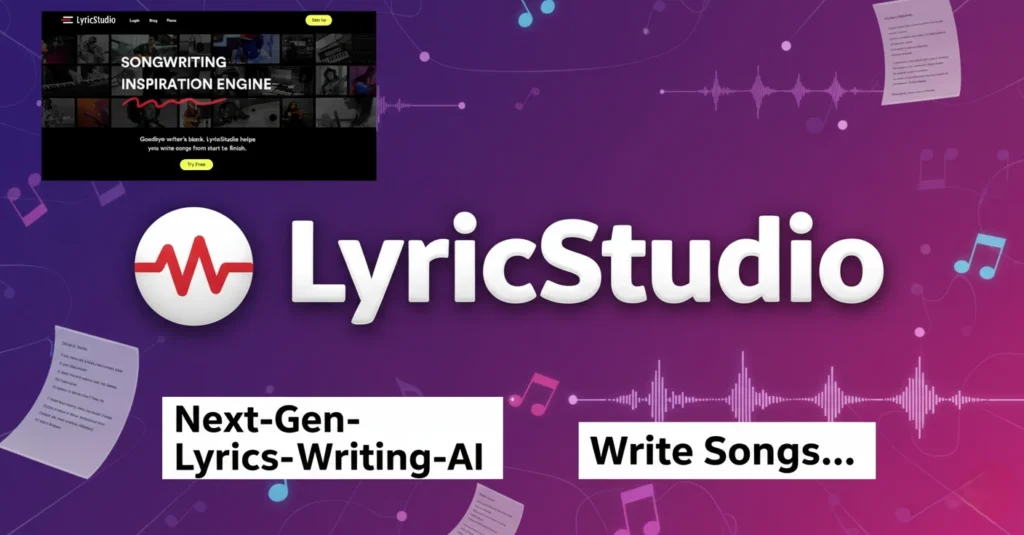
Key Features:
Who Can Use It:
Brief Introduction:
DeepBeat is a big deal for people who are into hip-hop and rap. This advanced AI song generator focuses on complicated rhyme schemes and meter, which are very important in rap. It helps you come up with coherent, rhyming lines, which makes it a very useful tool for both experienced rappers looking for new ideas and hopeful artists working to improve their flow. Some people say it’s the best AI tool for rap songs.
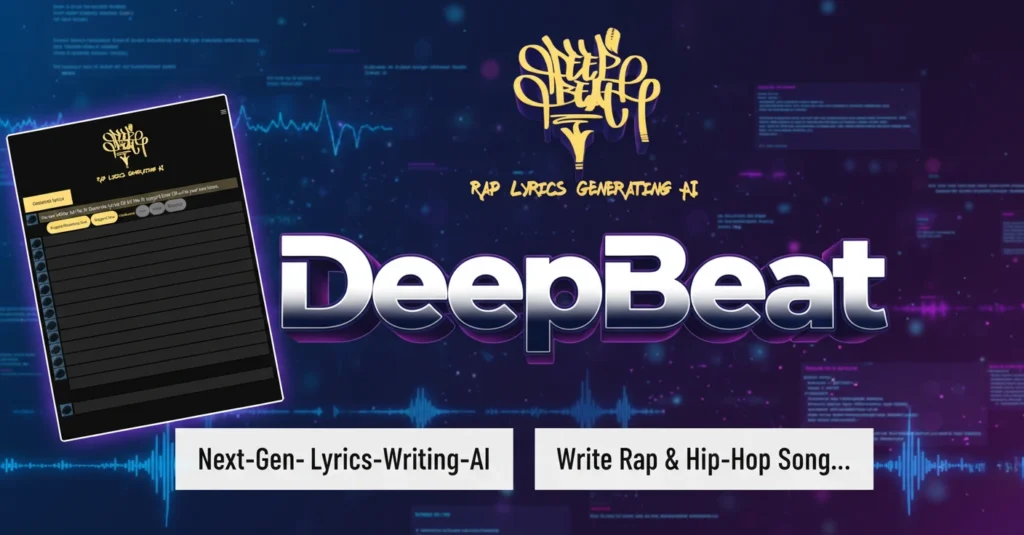
Key features:
Who Can Use It:
Brief Introduction:
AIVA, or Artificial Intelligence Virtual Artist, is not a song generator. Instead, it is a powerful AI for writing music. It can make original musical music in many styles. This is why it’s here. Because songs are at their best when the words and music go together. You can make a track with AIVA and then use one of the lyric AI tools to write lyrics that go with that tune and mood. These steps can help you come up with ideas that you wouldn’t get from reading text alone.
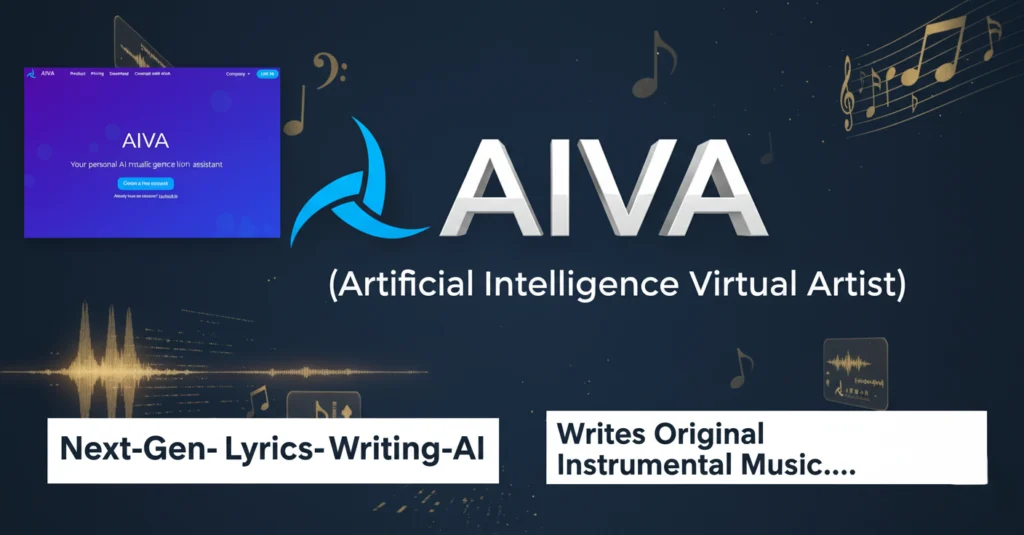
Key Features:
Who Can Use It:
Brief Introduction:
Boomy is another AI music generator that focuses on speed and ease of use, letting users quickly make their own songs with simple musical patterns. Its lyric abilities aren’t as advanced as those of dedicated lyric AIs, but it can make a full track with just placeholder lyrics or a simple voice line. This is great for making quick demos and hearing how your AI-made words might sound with a beat.
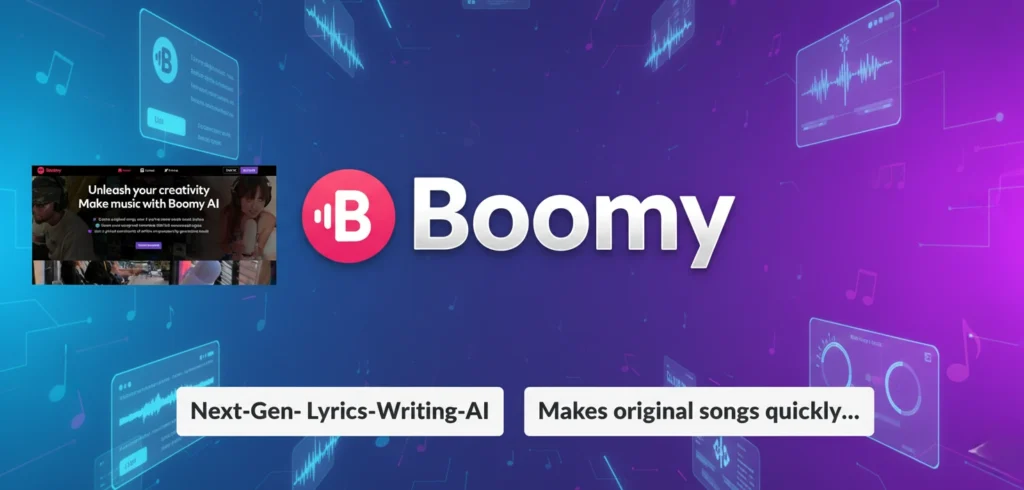
Key features:
Who Can Use It:
Brief Introduction:
Amper Music is an AI tool for writing music that goes one step further and wants to be a full-fledged creative studio. It’s made to make custom music tracks and scores fast. As a result, it can be used by songwriters to create the instrumental part of a song, then add AI-generated lyrics, and even change the music to fit the way you write lyrics and the way your songs make you feel. This makes it a great tool for indie singers.
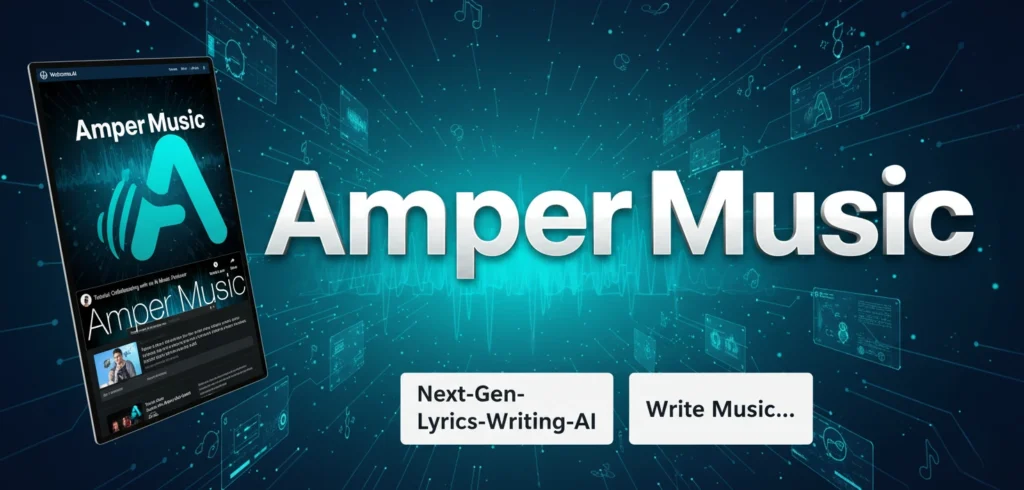
Key features:
Who Can Use It:
The development of AI platforms for writing lyrics has changed the way songwriters and content makers work creatively. In 2025, these tools aren’t just ideas from the future; they’re necessary partners that can help you get past writer’s block, spark new ideas, and speed up the whole process of writing a song. You now have the power to do anything, from coming up with new rhymes to making complicated tunes.
OpenAI’s ChatGPT/GPT-4o and Google Gemini are still the best for coming up with pure song ideas and general brainstorming. For dedicated lyricists who need structured help and rhyme ideas, LyricStudio was made just for you. Rappers will need DeepBeat because it makes it easy to come up with unique rhymes. And if you want to make full song demos fast, combining a lyric AI with Boomy or Amper Music is a fun way to do it.
The most important thing to remember is that AI isn’t here to replace talent; it’s here to improve it. It’s about using technology to find new opportunities, get better at what you do, and make your creative ideas come to life faster and better than ever.
In most cases, yes, as long as you make major changes to the AI’s work and turn it into your own original work. As of September 2025, copyright usually covers material that was made by people. The song is considered yours if you had a lot to do with making it and giving it ideas. Always look at the terms of each site.
Many people think that DeepBeat is the best AI tool for writing rap songs because it can understand and create complex rhyme schemes, rhythms, and flows, all of which are important in hip-hop and rap.
Some AI song makers, like Boomy, can put together simple lyrics and a made-up melody. But if you want complex melodies and lyrics, it’s often best to use both an AI lyric generator (like LyricStudio) and an AI music creation tool (like AIVA or Amper Music) together, and then make any necessary changes.
To get it right, you need to change and customize a lot. Add your own voice, experiences, feelings, and special information that only you know. Stay away from general words, use specific images, and make sure the tone fits with what you want to say artistically. AI gives you a place to start, but you make it sing with your own touch.
In most places, you can’t get copyright for the straight output of an AI that didn’t have much human input. However, you can protect your original work with copyright if you use AI to help you be creative and then heavily edit, adapt, and change the text that AI generates into something new.
A lot of general-purpose AI models, like OpenAI’s ChatGPT and Google Gemini, have free versions or tiers that are great for writing lyrics. These can be very helpful for writing lyrics because they give you ideas, rhymes, and creative text tasks for free.
Of course! AI lyric generators like LyricStudio are great at coming up with rhymes, alliterations, and even helping you stick to common song frameworks like verse, chorus, and bridge. With well-thought-out hints, general AI models like ChatGPT can also help with these.
Be very specific in your prompts, like “unique metaphors,” “unconventional imagery,” or “avoid common phrases related to X.” After you’ve written, go back and edit out any clichés, replacing them with more unique and personal words. The AI can also be asked to “rewrite this line to be less cliche.”
Thank you for reading this article. I hope this article helps you a lot, and you will have to search again for top AI platforms for lyrics and writing on the internet.